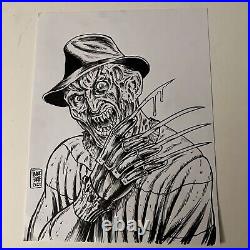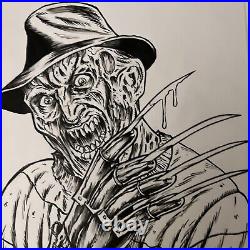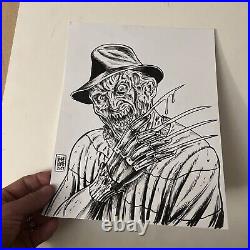



Freddy Krueger Nightmare On Elm Street Original Art drawing By Frank Forte. Comic art drawings By Frank Forte (Bob’s Burgers, Solar Opposites, Heavy Metal) sketches. Original Art Copic Marker Drawing using Copics, pencil, crayon, caran dache On 8.5 x 11 paper. Comes with COA CERTIFICATE OF AUTHENTICITY. I’m influenced by classic cartoons and comic books. My paintings are an assemblage of inspiration of what I grew up watching on TV and scouring conventions and videos stores for that censored, banned or forgotten cartoon. After studying animation, I wanted to try and capture the feeling and emotion of a moving cartoon on a flat canvas. If I can give the illusion of movement, laughter and or horror to the viewer, then I have somehow succeeded. Frank Forte is an artist, writer, and storyboard artist. His work has been exhibited at La Luz De Jesus Gallery (LA, CA), COPRO GALLERY (SANTA MONICA, CA), CASS Contemporary (Tampa, FL), DARK ART EMPORIUM (LONG BEACH, CA), STAN LEE? S film and TV credits include: SOLAR OPPOSITES, LOVECRAFT COUNTRY, Bob? S Burgers, 3 Below (Trollhunters spin-off), Truth or Dare, Insidious: The Last Key, Despicable Me 2, The Emoji Movie, LEGO Guardians of the Galaxy: The Thanos Threat, LEGO Star Wars: The Empire Strikes Out, The Super Hero Squad Show, Marvel Heroes 4D, and more. Frank is also the publisher of Asylum Press an indie graphic novel and comic book. Frank has written, illustrated and published such comics as; Bob’s Burgers, Heavy Metal, The Vampire Verses, Warlash, Fearless Dawn, Billy Boy, The Cletus and Floyd Show. Inspired by a steady diet of classic cartoons, comics and horror films, Frank Forte continues to explore the realm of disturbed characters that seem trapped in a nightmarish animated world. His most recent series of Neo-Pop paintings incorporate the reappropriation of figures and images we know from the yesteryear of the animated film, comic books, TV, advertising and pop culture as well as introducing Frank? Bob’s Burgers is an American animated sitcom created by Loren Bouchard for the Fox Broadcasting Company. The series centers on the Belcher family? Parents Bob and Linda and their children Tina, Gene and Louise? The show was conceived by Bouchard after he developed Home Movies. Bob’s Burgers is a joint production by Wilo Productions, Buck & Millie Productions, and 20th Century Fox Television and syndicated by 20th Television. The series follows BOB H. Jon Benjamin and his ever-quirky family who together run the restaurant Bob? Lowbrow, or lowbrow art, describes an underground visual art movement that arose in the Los Angeles, California area in the late 1960s. [1] It is a populist art movement with its cultural roots in underground comix, punk music, tiki culture, graffiti, and hot-rod cultures of the street. [2] It is also often known by the name pop surrealism. [3] Lowbrow art often has a sense of humor? Sometimes the humor is gleeful, sometimes impish, and sometimes it is a sarcastic comment. Most lowbrow artworks are paintings, but there are also toys, digital art, and sculpture. Some of the first artists to create what came to be known as lowbrow art were underground cartoonists like Robert Williams and Gary Panter. Early shows were in alternative galleries in New York and Los Angeles such as Psychedelic Solutions Gallery in Greenwich Village, New York City which was run by Jacaeber Kastor, [5] La Luz de Jesus run by Billy Shire[6] and 01 gallery in Hollywood, run by John Pochna. [5] The movement steadily grew from its beginning, with hundreds of artists adopting this style. As the number of artists grew, so did the number of galleries showing Lowbrow. In 1992 Greg Escalante helped orchestrate the first formal gallery exhibition to take low brow art seriously; painter Anthony Ausgang? S solo show Looney Virtues? At the Julie Rico Gallery in Santa Monica. The Bess Cutler Gallery also went on to show important artists and helped expand the kind of art that was classified as Lowbrow. The lowbrow magazine Juxtapoz, launched in 1994 by Robert Williams, Greg Escalante, and Eric Swenson, has been a mainstay of writing on lowbrow art and has helped shape and expand the movement. Highly polished imagery inspired by cartoon characters and scenery? That is how one could describe Lowbrow art, also known as Pop Surrealism, but the truth is that this unconventional movement is much more than that. Are we even entitled to calling it a movement? Many acclaimed critics and respectable institutions, put in charge to decide what gets to be accepted as art and what does not fit in the mainstream demand of museums, galleries and even collectors, would put Lowbrow in the latter category without thinking twice. But like many movements before it, Lowbrow art does not care about being recognized by the art world as legitimate; if anything, Lowbrow artists wrote their own rules in an unapologetic way, rules that were clear enough to make this whole creative field stand on its own without a single problem. Because of its roots in the underground culture, Lowbrow / Pop Surrealism became a populist matter, inspired by such vast variety of topics and aesthetics that it made itself easily relatable to a large number of artists and admirers. So what exactly is it that makes Lowbrow art so distinct and alluring? The Advent of Lowbrow Art. Born in the shady corners of Los Angeles in the late 1970s, Lowbrow originated in the artworks of underground cartoonists that were put on display in alternative galleries in New York and California. Because of their particular artistic approach, they weren? Mainly because they were based on the rawness of underground comix, the rebellion of punk music, the hot rod and surf culture of the West Coast and, of course, stylized cartoons and comics. In fact, it would seem as though Its Highness the art world was not particularly fond of this Lowbrow kind of humor, one that can be found in John Waters movies, or Acid house flyers, circus posters, kitsch art, Kustom Kulture, Japanese anime, second-rate horror movies, psychedelic art pieces and even graffiti and street art. As a consequence, Lowbrow art and its self-taught practitioners joined the club of the? Like illustrators, tattoo artists and comic book artists, and enjoyed its own status of an academically neglected movement which nevertheless thrived in a self-made environment. As such, Lowbrow art also managed to find home in many places around the globe and reflect their visual tendencies, thus evolving into many different branches and individual aesthetics. Although it did not have an official name until the beginning of the 1990s, Lowbrow art was already somewhat present in popular culture during the 1960s too, as its traces could be found in the works of underground comix cartoonists like R. Clay Wilson, Victor Moscoso and Robert Williams. Ever since its earliest days, Lowbrow was dedicated to poking fun at the conventional matters of any kind, using humor and sarcasm as its strongest tools.

